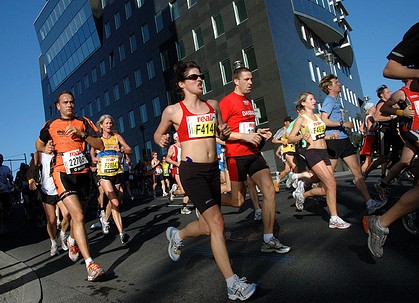What is the Meaning of Marathon Running
Marathon running is the act of participating in a long-distance race, typically 26.2 miles in length. This endurance sport involves running or jogging at a steady pace over an extended period, challenging the physical and mental limits of the individual.
Marathon running requires discipline, training, and dedication to complete the grueling distance. Participants aim to reach the finish line within a specific time, often pushing their bodies to the brink of exhaustion. The sport has a rich history dating back to ancient Greece, where the first marathon is said to have originated.
Today, marathon running has become a popular athletic pursuit, attracting individuals from around the world who seek personal achievement and a sense of accomplishment.

Credit: en.wikipedia.org
The History Of Marathon Running
Marathon running is a test of strength, endurance, and perseverance, with a rich history dating back to ancient times.
Origin And Legend Of The Marathon
The marathon’s origins are rooted in Greek history. The legendary run of Pheidippides, a Greek soldier, in 490 B.C.E., is believed to be the inspiration behind the modern marathon. According to the legend, Pheidippides ran from the battlefield of Marathon to Athens, a distance of about 26 miles, to deliver news of victory against the Persians. After delivering the message, he collapsed and died.
Evolution Of Marathon As A Sporting Event
The marathon made its debut at the inaugural modern Olympic Games in Athens in 1896. A Greek athlete, Spiridon Louis, emerged victorious, solidifying the event’s place in athletic history. Since then, marathons have become iconic, annual events worldwide, with athletes and enthusiasts from different walks of life participating in these ultimate tests of human endurance and willpower.
Physical And Mental Benefits Of Marathon Running
Marathon running goes far beyond just a physical challenge. It is a remarkable feat that can have an incredibly positive impact on both your body and mind. The combination of physical exertion, mental endurance, and sheer determination can lead to amazing transformations. Let’s explore the unique benefits that this ultimate test of endurance offers.
Improvements In Physical Health
Marathon running is a fantastic way to boost your overall physical health. It offers a wide range of benefits for your body, leaving you feeling stronger and healthier than ever before.
Some of the key physical benefits of marathon running include:
- Increased cardiovascular fitness: Running a marathon challenges your heart and lungs, improving their efficiency and endurance.
- Weight management: Regular marathon training helps you burn calories and build lean muscle, contributing to overall weight loss and maintenance.
- Stronger bones and joints: The impact of running strengthens your bones and joints, reducing the risk of conditions like osteoporosis.
- Improved immune system: Engaging in marathon training boosts your immune system, helping you stay healthier and fight off illnesses better.
- Enhanced metabolism: Long-distance running accelerates your metabolism, leading to increased energy levels and improved digestion.
Enhancement Of Mental Well-being
The mental benefits of marathon running are equally significant. Engaging in this challenging activity not only builds physical endurance but also enhances your mental well-being, promoting a positive mindset.
Here are some of the mental benefits that marathon running offers:
- Stress relief: Long-distance running releases endorphins, which are natural mood elevators, providing relief from stress and anxiety.
- Increased self-confidence: Accomplishing the rigorous training and crossing the marathon’s finish line boosts your self-confidence and self-esteem.
- Improved resilience: Marathon training pushes you to your limits, developing mental resilience that translates into other areas of life.
- Sharpened focus and concentration: The concentration required during marathon training enhances your mental clarity and ability to focus on tasks.
- Sense of achievement: Completing a marathon is an incredible achievement that boosts your sense of accomplishment and satisfaction.
So, if you’re looking for a transformative experience that can improve both your physical and mental well-being, consider challenging yourself with the incredible journey of marathon running.
Training And Preparation For A Marathon
Participating in a marathon is no ordinary feat. It requires months of dedicated training and careful preparation to build the physical and mental stamina needed to conquer the 26.2-mile journey. By establishing a training plan and paying attention to nutritional considerations, runners can maximize their chances of success on race day.
Establishing A Training Plan
Effective marathon training begins with a well-structured plan tailored to individual fitness levels and goals. The training plan should consist of gradual mileage increases, allowing the body to adapt and reduce the risk of injuries. It is crucial to strike a balance between pushing oneself and avoiding overtraining.
Here are some key factors to consider when establishing a training plan:
- Start with a solid base: Before starting marathon-specific training, it is essential to have a foundation of regular running. This helps prevent muscle imbalances and prepares the body for the demands of marathon training.
- Include a variety of workouts: Incorporating different types of runs, such as long runs, tempo runs, and speed work, helps improve endurance, speed, and overall performance.
- Schedule rest and recovery: Rest days are just as important as training days. They allow the body to repair and rebuild, reducing the risk of injuries.
- Listen to your body: Pay attention to any signs of fatigue or pain. If necessary, adjust the training plan accordingly by incorporating additional rest days or reducing mileage.
Nutritional Considerations For Runners
Proper nutrition plays a vital role in marathon training, providing the necessary fuel for performance and aiding in recovery. Here are some nutritional considerations for runners:
- Stay hydrated: Adequate hydration is crucial for optimal performance and preventing dehydration-related issues. Drink water regularly throughout the day and during training sessions.
- Consume a balanced diet: Focus on whole foods, including lean proteins, complex carbohydrates, and healthy fats. These provide essential nutrients and support overall health.
- Pre-run fuel: Consume a small meal or snack containing carbohydrates and some protein 1-2 hours before a run to provide energy and prevent hunger.
- Post-run recovery: Consume a combination of carbohydrates and protein within 30-60 minutes after a run to replenish glycogen stores and aid in muscle recovery.
- Consider supplementation: In some cases, supplements like electrolytes, vitamins, or protein powder may help fill nutrient gaps. Consult with a healthcare professional before incorporating supplements into your routine.
By establishing a training plan and paying attention to nutritional considerations, marathon runners can optimize their preparations for the race, improve performance, and increase the likelihood of crossing the finish line with a sense of accomplishment.
Common Challenges Faced By Marathon Runners
Marathon running is a challenging endeavor that requires dedication, perseverance, and resilience. While the feeling of accomplishment at the finish line is incomparable, the journey to get there is filled with hurdles and obstacles. Marathon runners encounter various common challenges that test their physical and mental strength.
Physical Strain And Injuries
Marathon running puts immense strain on the body, leading to a range of potential injuries. Runners often face fatigue, muscle cramps, blisters, and the risk of overuse injuries such as runner’s knee, shin splints, and stress fractures. These physical challenges not only affect training and performance but also require adequate recovery and rehabilitation to prevent long-term damage to the body.
Mental Hurdles And Motivation
Enduring the mental challenges of marathon running is equally demanding. Runners encounter self-doubt, fear, and anxiety, especially during the grueling long-distance runs. Finding motivation to stay committed to training, pushing through mental barriers, and maintaining focus during the race are significant mental hurdles that marathon runners have to overcome.
Celebrated Marathon Events Around The World
When it comes to marathon running, there are several iconic events that attract runners and spectators from across the globe. The Boston Marathon, London Marathon, and New York City Marathon are among the most revered and cherished races in the running community.
Boston Marathon
The Boston Marathon is one of the oldest and most prestigious marathons in the world, held annually on Patriots’ Day in April. Runners from all over the world strive to qualify for this historic race, which spans 26.2 miles from Hopkinton to Boston.
London Marathon
The London Marathon is a major highlight in the global running calendar, taking place in April and drawing elite athletes as well as thousands of charity runners. The course passes through iconic landmarks like Tower Bridge and Buckingham Palace, offering a scenic and vibrant race experience.
New York City Marathon
The New York City Marathon is renowned for its diverse course that navigates through all five boroughs of the city, culminating in Central Park. This massive event attracts runners of all levels, creating an electrifying atmosphere that celebrates the spirit of running.
In conclusion, these celebrated marathon events not only showcase the physical endurance of runners but also the unity and camaraderie fostered by the sport of distance running.

Credit: worldathletics.org

Credit: worldathletics.org
Frequently Asked Questions On What Is The Meaning Of Marathon Running
What Does Marathon Symbolize?
A marathon symbolizes endurance, determination, and perseverance. It represents pushing limits, overcoming challenges, and achieving goals through hard work.
What Is The Literal Meaning Of The Word Marathon?
The literal meaning of the word “marathon” is a long-distance running race of 26. 2 miles.
What Is The Concept Of A Marathon?
A marathon is a long-distance race that covers a distance of 26. 2 miles (42. 195 kilometers) and requires physical endurance and mental strength. It is a popular sport that attracts participants from around the world.
Conclusion
Marathon running encompasses physical endurance, mental strength, and personal triumph. It is not just a sport, but a metaphor for life’s challenges. As we push our limits in long-distance running, we discover our inner strength and determination. Ultimately, marathon running is a journey of self-discovery and resilience.





